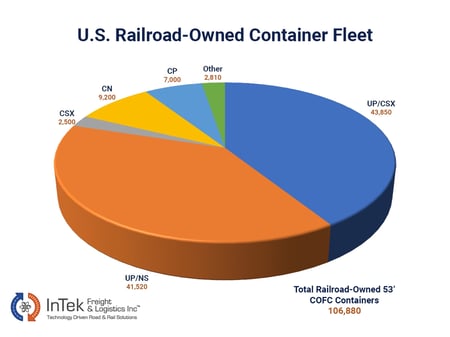Intermodal transportation is a viable option for many shippers, but just as with any other freight mode, it can face challenges relating to capacity, equipment, labor and more. One way to mitigate many of those challenges is access to private intermodal containers. Private intermodal containers - also known as private boxes - offer the advantage of flexibility for intermodal marketing companies and the shippers they serve who have access to them. Those who don't have that access - including asset-based logistics providers and even plenty of IMCs - are handcuffed to either their own containers or those of a specific equipment partner. This means when capacity challenges arise, these companies lack the flexibility of an intermodal alternative.
Who owns domestic intermodal containers?
Domestic intermodal containers fall under two types of ownership, those owned by the Norfolk Southern, Union Pacific and CSX railroad carriers, and private containers owned by companies led by J.B. Hunt, Hub Group and Schneider - and now even including the likes of Amazon and Wal-Mart plus many others. There are many containers in the marketplace. As of summer 2023, there are now nearly 400,000, divided up as noted below:


The private intermodal container market share has only grown, with the aforementioned additions of retailers who fall under the guise of beneficial cargo owners (BCOs) as well as expansion of capacity of the market leader.
How does broad container access offer flexibility?
The advantage of an IMC like InTek Freight & Logistics is the broad access to private containers, as well as access to railroad-owned containers due to relationships with Class I railroads. This means clients get the flexibility of capacity wherever it exists as well as comparison shopping to get the best price when capacity is available across multiple avenues. BNSF is the primary railroad that carries private containers, as it does not own containers, while the others as mentioned before do own their own UMAX and EMP containers - at the same time handling capacity for Hub Group and XPO. Since railroads do not sell retail - as in, they do not sell capacity direct to shippers - shippers must access the UP, NS and CSX boxes through an IMC that represents the Class I networks.
If you're ready to take the next step, at InTek Freight & Logistics, we can help. Just tell us what you need and we'll discuss how our expertise can help with the unique shipping challenges your business faces. Rather do a bit more research first? View our Freight Guides for comprehensive articles and eBooks on all things freight and logistics.
